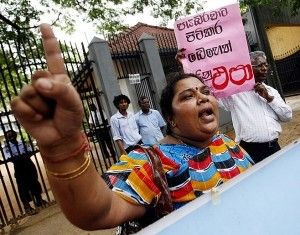Maid Relief: UN Ratifies Treaty To Protect Domestic Workers Rights

The United Nations has announced the ratification of a treaty that outlines new international standards for the rights of domestic workers.
The Convention on Domestic Workers was adopted in June 2011 during the annual conference of the U.N.'s International Labour Organization, but needed two more countries to ratify it before it could be implemented. Uruguay ratified it in June 2012, and on Thursday the Philippines followed suit.
"Today's ratification by the Philippines sends a powerful signal to the millions of domestic workers who will be protected when the convention comes into force," said ILO Director-General Juan Somavia, in a statement.
"I hope it will also send a signal to other member states and that we will soon see more and more countries committing to protect the rights of domestic workers."
The new standards stipulate that domestic workers receive the same protections and rights as other workers, with reasonable work hours, at least one day a week off, and the right to free association and collective bargaining.
The ILO estimates that there are between 50 and 100 million domestic workers worldwide, and in developing countries, they constitute between 4 and 12 percent of employed persons. Many domestic workers are subject to abuses such as unhealthy working conditions, long hours, and inadequate pay.
A report from Human Rights Watch in May looking at women from Southeast Asia who immigrated to Lebanon and the United Arab Emirates to work as domestic workers found that many were "suffering from the same violations and mistreatment." Many maids immigrate on work visas, so their ability to stay in the country is tied to their employer's wishes, according to the Economist.
"Because they are such a vulnerable class of employees, employers were able to get away with appalling behavior," said the report. "Women having no time off at all and working long hours like 6 until 2 in the morning. Sleeping in bad conditions, not having a bedroom, sleeping on the floor in the kitchen. We also came across some serious physical violations including rape, sexual assault, and physical violence."
HRW also said that at least one domestic worker died every week in Lebanon between January 2007 and August 2008. Around half of those deaths were suicides.
Several countries, including Kenya, Ethiopia, Nepal, and the Philippines, no longer allow their citizens to work in the Middle East because of the mistreatment they have suffered there.
© Copyright IBTimes 2024. All rights reserved.






















